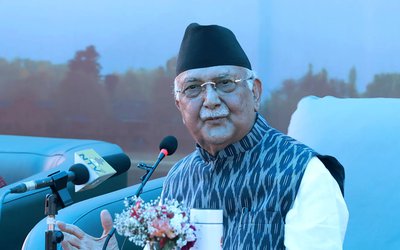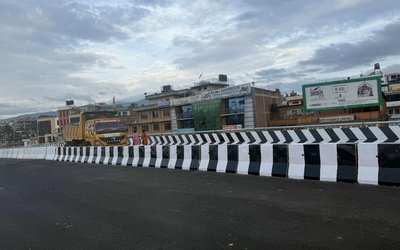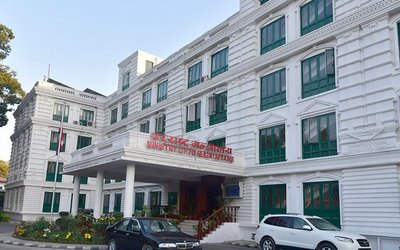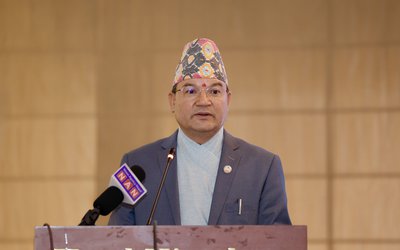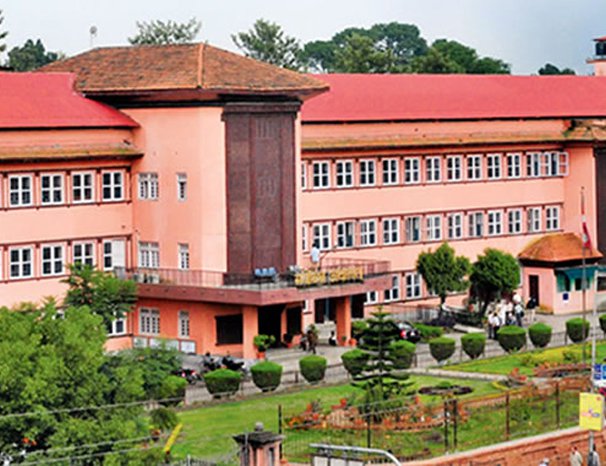
Supreme Court today pronounced a landmark judgment related to Covid-19 and its impact on humanity. The writ petition filed by Advocate Roshani Poudyal and Advocate Saroj Krishna Ghimire was finally decided by the bench of Honorable Justice Sapana Pradhan Malla and Honorable Justice Prakash Kumar Dhungana. Having 48 pages long judgment, the Supreme Court has issued Mandamus and Directive Orders to the Government of Nepal and other respondents on various issues related to COVID-19. The judgment is said to create historical importance for now and for the future time of pandemic and probably the unique judgment made not only in the Nepalese context but worldwide by addressing and ordering on the pandemic situation for the protection of people's health, safety, privacy and well-being.
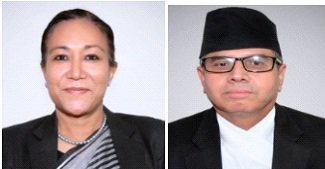
Justices Sapana Pradhan Malla and Prakash Kumar Dhungana
The Supreme Court in its final judgment said that COVID-19 victim privacy is paramount in any circumstances. The Information Commission had published a Notice of Order to the Ministry of Health and Population to mentioned about the residential address and home address of the victims or deceased of COVID-19, which the Supreme Court strike down by the writ of certiorari and said that the dignity of the victim needs much protection at the time of pandemic for not only controlling for further spread of the virus but also to protect them against social discrimination, boycott, social stigma and hate crimes. The Supreme Court said that it shall be the obligation of the state to ensure that constitutional and legal rights of privacy of the victim shall in no way be jeopardized by public dissemination and thus the order of Mandamus is hereby issued against disclosure of the personal details of the COVID-19 victim without their consent.
The Petitioners had claimed that the Government is not gender-responsive despite the constitutional guarantee of inclusion at all levels of mechanism and policymaking. The petition which was in reference to the High-Level Committee formed by the Government of Nepal to respond to the COVID-19 lead by the Ministry of Defense IshworPokhrel in which none of the women members were included. Though the Committee was later quashed due to its inability to respond to the pandemic, the committee formed subsequently dated 2077.2.8 for the prevention and control of COVID-19 named Corona Crises Management Center also lacks the representation of women. In this reference, the Supreme Court said that the Government must take into consideration different experiences women faces and tolerate. Hence, any plans or policies formulated by the Government must address such unique situation women faces. The Court realized that policies must address the adverse and disproportionate effects against women in an effective and efficient manner while working to control the COVID-19 and must be feminist responsive. The Supreme Court in its judgment said that equality and inclusiveness is the basic content of the constitution guaranteed for women, hence the directive order is hereby issued against the Government to ensure proportionate inclusion and gender balance must be there at all levels of decision making and formation of committees.
The Supreme Court also realized that the pandemic of COVID-19 and lockdown has caused serious impact over women in terms of domestic and gender-based violence and they are disallowed to have access over justice. Such a scenario is more in the pandemic where women face discrimination and various tortures as evident from various news and reporting. The Court also noted that the increment of such incidents has risen. Hence there requires the preparedness, response and recovery mechanism by keeping women at the center of COVID-19 response. Realizing this critical scenario Supreme Court ordered that the Government shall set up a coordination system to receive a complaint against domestic violence, interim relief and protection to the victim and setting special fund, online case registration/hearing mechanism, immediate rescue and relief mechanism to women and children, and setting up 753 helplines at local government and Facebook operation for such matters.
The Supreme Court also noted that in the process of repatriation of Nepalese citizens from abroad, a priority shall be given to the women, children, pregnant, differently able persons and elderly people who are at the high-risk group. The Supreme Court further ordered that special quarantine shall be set up for women, children, pregnant, differently able persons and elderly people that maintain social distance and have the adequate facility of drinkable water, food on priority.
Regarding safe motherhood and reproductive health, which was one of the major issues of the claim for the protection, the Supreme Court said that it has already issued a Mandamus Order for the protection of pregnant, infants, their care and medication arrangement. The Supreme Court realizes that though the Reproductive Health Rights 2018 has been enacted due to the lack of Reproductive Health Rights Regulation the statutory mechanism has not been implemented and thus Supreme Court ordered to formulate the regulation on priority by issued order of Mandamus.
Supreme Court also realizes that COVID-19 has not only made an impact on the wellbeing of the people, but it has also equally caused the psychological problem in the people and its escalation is alarming. Hence it has become important to address the impact it has caused over citizens. The Supreme Court realizes the content of the petition that people are living on the anxiety, stress and fear if COVID-19 attacks them which will result in them having the social stigma and hates. The Supreme Court noted the social stigma imposed against front line workers including medical personal. Hence the Supreme Court issued the Directive Order against the Government to ensure adequate measures are taken against psychological impact and immediately set up the WHO standard quarantine center, health center, and psychological consultant at all local levels and provide psychological services without delay. Similarly, the Supreme Court realizes that the pandemic may lead the women workers' termination from the job on priority. The court noted that the pandemic has had a disproportionately negative impact on marginalized groups and they are more vulnerable terms of their job security either they lose the job or male in the family. The economic crises have also become problems of domestic violence. Hence the Supreme Court issued Directive Order against the Government to ensure alternative means of earning and employment packages shall be introduced keeping women on priority.
Regarding the safety and security of women in the front line to combat COVID-19, the Court also realized that women are always in front of the pandemic as medical personnel, employee, or caretaker. On the other side, the Medical professional not only keep themselves at risk but to their family too. Hence Supreme Court ordered the Government to ensure the PPE and other safety equipment shall be provided to a medical professional who is in front line having the best quality and inadequate number for free and arrange their working time adequately.
One of the important claims raised by the petitioner was related to Mandamus Order against the parliament to enact pandemic laws due to the inefficiency and inadequacy of the existing laws to address the problems brought by the COVID-19. Petitioners claimed that the problem is more surfaced among women and children due to the absence of the law for such a scenario hence there is high urgency of pandemic law for the control, restriction and elimination of pandemic. For this purpose, the Supreme Court analyzed the existing contagious law enacted Fifty Six years back and observed that the contagious law is not sufficient to address such pandemic and various dimensions of peoples life including medical treatment, economic, social and psychological wellbeing of women children, differently able persons and elderly people and sick people. The Court in its verdict said that the COVID-19 has brought a different scenario than what the contagious law speculated Five decades back and not able to draw its vision in terms of prevention, response and recovery form the pandemic. The Act is not able to bring coordination among stakeholders not able to guide for framing strategic policies to combat the pandemic. The Court also observed that the Public Health Service Act 2018 only limits with immediate health services and has no mechanism to work form the time of COVID-19 checkup to their treatment and recovery and rescue except making responsible to the Ministry of Health and Population to set the standard of control and the Ministry is also not able to address the wider impact of COVID-19 based on these existing laws. The Court noted that due to the absence of codified laws to address the pandemic situation, the Government has been adopting the health measures and is ordering by shielding over these insufficient laws and thus required to frame pandemic law. Upon noting this the Supreme Court ordered the Government of Nepal to carry a study to identify if the existing laws are adequate and effective and to frame the pandemic law by taking into consideration the gender-responsive and high-risk groups.

(Petitioners Advocate Roshani Poudyal and Advocate Saroj K Ghimire)
Supreme Court’s decision has been taken as a landmark achievement to address the pandemic. The Petitioners Advocate Roshani Poudyal and Advocate Saroj K Ghimire also claimed that the decision is unique and well written to address all issues relating to a pandemic and will enable the Government to enact pandemic law so that any ad-hoc measures will not require to adopt for the government to combat pandemic now and in the future. The petitioners also mentioned that without any delay the Government should implement each word, orders and directives of the Supreme Court as Supreme Court has made the executive and legislature easy to work for efficient mechanisms of prevention, response and recovery. Supreme Court decision has set milestones and examples for other jurisdictions as well, as said by the petitioners.
- Supreme Court upholds appointment of 52 officials
- Jul 03, 2025
- Weather Forecast: Generally Cloudy In The Hilly Areas With Heavy Rainfall In Some Areas Of Bagmati And Koshi Province
- Jul 03, 2025
- MCA-Nepal Welcomes Continued U.S. Support for MCC Nepal Compact Implementation
- Jul 02, 2025
- Sutlej to sell electricity from Arun III to Uttar Pradesh
- Jul 02, 2025
- PHDCCI India-Nepal Centre Organises “India-Nepal Fintech Summit 2025” In New Delhi
- Jul 02, 2025

